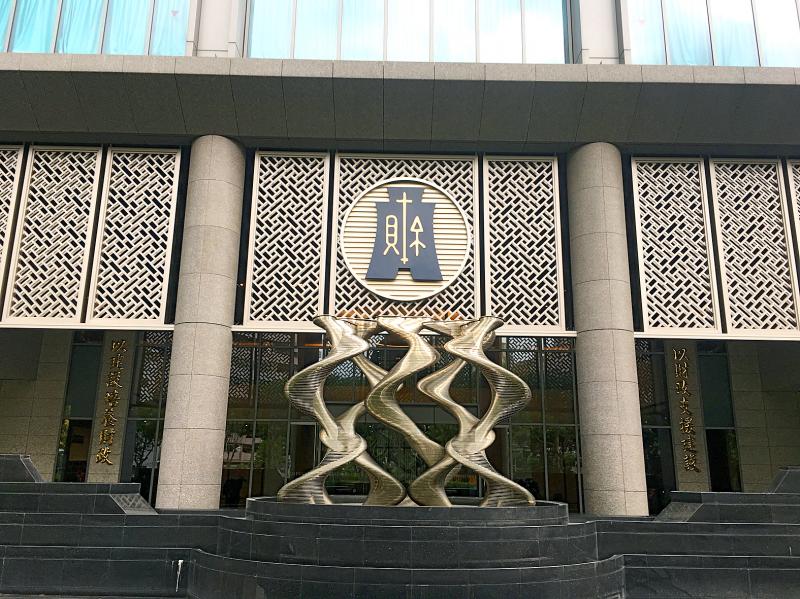The nation’s tax revenue last month increased 13.1 percent from a year earlier to NT$302 billion (US$10.73 billion), as personal income benefited from dividend payments, but gains on securities transactions contracted amid ebbing investment interest, the Ministry of Finance said yesterday.
Personal income tax soared 40 percent year-on-year to NT$12.4 billion, supported by dividend distributions and the absence of tax returns, Department of Statistics Deputy Director-General Chen Yu-feng (陳玉豐) told a news conference in Taipei.
Corporate income tax gained 20.5 percent to NT$105.4 billion, while business tax grew 5.4 percent to NT$84.8 billion, signs that economic activity picked up following a local outbreak of COVID-19 infections, the ministry said.

Photo: Clare Cheng, Taipei Times
Sales tax increased 2.7 percent to NT$14.5 billion, as vehicles sales recovered momentum, although people consumed less fuel due to disease prevention measures, it said.
Securities transaction tax grew 28.5 percent to NT$17.8 billion, as average daily turnover on the Taiwan Stock Exchange increased 58.33 percent year-on-year to NT$365.6 billion, it added.
However, trading volume posted a 27.2 percent retreat from one month earlier to the lowest mark this year, Chen said.
Foreign investors have cut their holdings in local shares and funds have flowed to the US market on the expectation that the US Federal Reserve would soon taper its bond purchases to pave the way for interest rate hikes amid inflationary pressures.
Trading in the shares of shipping companies and steelmakers dampened significantly, Chen said.
Heavyweight technology shares also took a hit amid the global fund flows, Taiwan Stock Exchange data showed.
Land value increment tax tumbled 33.5 percent to NT$7.1 billion, after taxable deals shrank 21.3 percent year-on-year, the ministry said.
In the first nine months of the year, tax revenue logged a 22 percent gain to NT$2.24 trillion, ahead of the budget schedule this year by 19.5 percent, it said.

South Korea’s equity benchmark yesterday crossed a new milestone just a month after surpassing the once-unthinkable 5,000 mark as surging global memory demand powers the country’s biggest chipmakers. The KOSPI advanced as much as 2.6 percent to a record 6,123, with Samsung Electronics Co and SK Hynix Inc each gaining more than 2 percent. With the benchmark now up 45 percent this year, South Korea’s stock market capitalization has also moved past France’s, following last month’s overtaking of Germany’s. Long overlooked by foreign funds, despite being undervalued, South Korean stocks have now emerged as clear winners in the global market. The so-called “artificial intelligence

Chinese artificial intelligence (AI) start-up DeepSeek’s (深度求索) latest AI model, set to be released as soon as next week, was trained on Nvidia Corp’s most advanced AI chip, the Blackwell, a senior official of US President Donald Trump’s administration said on Monday, in what could represent a violation of US export controls. The US believes DeepSeek will remove the technical indicators that might reveal its use of American AI chips, the official said, adding that the Blackwells are likely clustered at its data center in Inner Mongolia, an autonomous region of China. The person declined to say how the US government received

FORTUNES REVERSED: The new 15 percent levies left countries with a 10 percent tariff worse off and stripped away the advantage of those with a 15 percent rate In a swift reversal of fortunes, countries that had been hardest hit by US President Donald Trump’s tariffs have emerged as the biggest winners from the US Supreme Court’s decision to strike down his emergency levies. China, India and Brazil are among those now seeing lower tariff rates for shipments to the US after the court ruled Trump’s use of the International Emergency Economic Powers Act to impose duties was illegal. While Trump subsequently announced plans for a 15 percent global rate, Bloomberg Economics said that would mean an average effective tariff rate of about 12 percent — the lowest since

‘SEISMIC SHIFT’: The researcher forecast there would be about 1.1 billion mobile shipments this year, down from 1.26 billion the prior year and erasing years of gains The global smartphone market is expected to contract 12.9 percent this year due to the unprecedented memorychip shortage, marking “a crisis like no other,” researcher International Data Corp (IDC) said. The new forecast, a dramatic revision down from earlier estimates, gives the latest accounting of the ongoing memory crunch that is affecting every corner of the electronics industry. The demand for advanced memory to power artificial intelligence (AI) tasks has drained global supply until well into next year and jeopardizes the business model of many smartphone makers. IDC forecast about 1.1 billion mobile shipments this year, down from 1.26 billion the prior